 Many million cusecs of water have flown down the Ganges and other rivers since EducationWorld presented the success mantras of India’s 25 best school principals four years ago (EW March 2007). Since then, education — a subject of marginal interest to most people at the time — has moved from the periphery of the national radar to near centre. Suddenly there is blinding awareness that the country’s huge 525 million children and youth population — a dismal failure of the world’s first official national family planning programme which has been slyly transformed into a ‘demographic dividend’ by wiseacres of the Planning Commission and the establishment — could well morph into a demographic disaster unless they are truly educated and skilled to meet the formidable challenges of the 21st century.
Many million cusecs of water have flown down the Ganges and other rivers since EducationWorld presented the success mantras of India’s 25 best school principals four years ago (EW March 2007). Since then, education — a subject of marginal interest to most people at the time — has moved from the periphery of the national radar to near centre. Suddenly there is blinding awareness that the country’s huge 525 million children and youth population — a dismal failure of the world’s first official national family planning programme which has been slyly transformed into a ‘demographic dividend’ by wiseacres of the Planning Commission and the establishment — could well morph into a demographic disaster unless they are truly educated and skilled to meet the formidable challenges of the 21st century.
But with the 1.26 million schools of the Central and state governments plagued by inadequate funding, mass teacher apathy and absenteeism, and abysmal learning outcomes as testified by the Annual Status of Education Reports (ASER) of the Mumbai-based NGO Pratham, the onus of raising teaching-learning standards in K-12 education has devolved upon the country’s 293,000 private and particularly 175,885 independent or unaided primary-secondaries, some of century plus vintage
which against all odds have established global reputations for providing world-class academic and extra-curricular education. Unsurprisingly, private independents have overwhelmingly dominated the annual league tables of India’s Most Respected Schools Survey published by EducationWorld since 2007.
Against the backdrop of neither the grandly titled Union ministry of human resources development nor government schools being able to rise to the challenge, and growing panic that the country isn’t graduating sufficient numbers of adequately educated and skilled youth to sustain the 8 percent annual growth rate of the Indian economy, last month EducationWorld once again conducted an informal survey to discover the success mantras of India’s best school principals. Based upon institutional knowledge within EW (estb. 1999) and after sounding expert opinion in academia, the principals featured in the pages following are undoubtedly successful, though the selection is not exhaustive. Several high-profile principals invited to share their leadership mantras either didn’t respond or chose not to for reasons best known to themselves.
Nevertheless there is likely to be a consensus within academia and the knowledgeable public that the principals interviewed for this cover feature have been eminently successful in shaping their schools into islands of excellence. Therefore under the shadow of the RTE Act, 2009 which threatens deep incursions into the autonomy of private schools, learning about their leadership mantras and institutional aspirations is likely to inspire their counterparts in K-12 schools countrywide to find ways and means to cope with the challenges of 21st-century school education in India.
Meera Isaacs
Cathedral & John Connon School, Mumbai
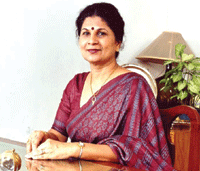 An alumna of Pune and Mumbai universities, Meera Isaacs has been with the Cathedral and John Connon School (CAJCS), Mumbai (estb. 1860) for over 34 years and was appointed principal in 1996. CAJCS was ranked India’s most respected day school in the EducationWorld-C fore India’s Most Respected Schools Survey 2010.
An alumna of Pune and Mumbai universities, Meera Isaacs has been with the Cathedral and John Connon School (CAJCS), Mumbai (estb. 1860) for over 34 years and was appointed principal in 1996. CAJCS was ranked India’s most respected day school in the EducationWorld-C fore India’s Most Respected Schools Survey 2010.
What should be the purpose of school education?
School education is all about doing the groundwork for the future. Children must be equipped with the skills and knowledge to deal with constant change.
Education thinker/philosopher you admire the most.
Maria Montessori
and Steiner, Adler, Kilpatrick and Bruner. However, what underpins my philosophy of life is what I learned from my mother as I grew up.
What is the differentiating characteristic of CAJCS?
The belief that every child has at least one strength which should be developed. That is why we cater to differently abled children, offer classes for the gifted, and give each child the opportunity to be the best she can be.
Define your leadership style.
I believe in doing the right thing, being fair. I have a vision for the school, and would like to be thought of as innovative, inspirational and motivational.
To what extent have you been able to implement your education philosophy in CAJCS?
With whole-hearted support of our board of governors, teachers and parents, I have been given every opportunity to implement my vision for the school.
Are you for or against the RTE Act mandating 25 percent reservation for underprivileged children in private schools?
While the RTE is well-intentioned, I don’t think it has been thought through. What we need are many more schools with good, committed teachers.
Your future plans for CAJCS.
We would like to introduce the IB diploma programme as an additional option and re-do the infant section. If we are able to find the premises, we will set up a full-fledged teacher training school and another for the physically challenged.
Unwind/de-stress with family and friends, read, watch films, plays and travel.
Peter McLaughlin
The Doon School, Dehradun
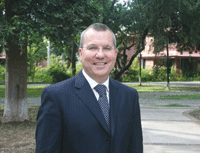 An alumnus of London and Rhodesia (now Zimbabwe) universities and the London School of Economics, Dr. Peter McLaughlin is headmaster of The Doon School (TDS), Dehradun, India’s top-ranked legacy boarding school in all EW annual surveys since 2007.
An alumnus of London and Rhodesia (now Zimbabwe) universities and the London School of Economics, Dr. Peter McLaughlin is headmaster of The Doon School (TDS), Dehradun, India’s top-ranked legacy boarding school in all EW annual surveys since 2007.
The purpose of school education should be to fulfill the potential of every student in all aspects of life. Its main purpose is not training, although there will be skills developed over time. The critical elements are the development of character — The Doon School has been described as “a crucible of character” and ethics.
Most admired education thinker/philosopher. At present, it is still Howard Gardner. His work on multiple intelligences reinforces and underpins those who, like me, believe in holistic education.
Differentiating characteristic of TDS. The Doon School is committed to attracting exceptional boys and masters to serve a meritocratic India in a global society. Service — to the community, state, nation and humanity — is in the DNA of The Doon School.
Leadership style. My style is ‘collaborative’. I am assertive and, at the same time, cooperative. There are certain ‘non-negotiables’ but I believe in wide and timely consultation.
Education philosophy implementation success. The Doon School is the perfect environment for me in this respect. A 24/7 learning environment, which is also a home for masters and boys, is exactly where I need to be.
For or against the RTE Act quota in private schools? The Doon School already has a quarter of its students on scholarship. The egalitarian ethos of the school will make it easier for us than most private schools to embrace the spirit of the RTE Act.
Future plans for TDS. We have recently drawn up a ten-year strategic plan and roadmap to the future. We are implementing a vision of The Doon School continuing to be one of India’s best schools but also taking its rightful place among the great schools of the world.
Unwind/de-stress. I sketch and paint to unwind, but the best de-stressor is talking to the boys here.
Siddhartha Menon
Rishi Valley School, Chittoor
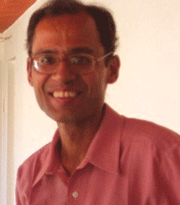 An English literature postgrad of Delhi University, Siddhartha Menon has served with several Krishnamurti Foun-dation schools for over two decades and is currently principal of the co-ed Rishi Valley School (RVS), Chittoor (Andhra Pradesh), co-ranked the country’s premier boarding school in the EducationWorld-C fore India’s Most Respected Schools Survey 2010.
An English literature postgrad of Delhi University, Siddhartha Menon has served with several Krishnamurti Foun-dation schools for over two decades and is currently principal of the co-ed Rishi Valley School (RVS), Chittoor (Andhra Pradesh), co-ranked the country’s premier boarding school in the EducationWorld-C fore India’s Most Respected Schools Survey 2010.
Purpose of school education. School education should help students become responsible global citizens in a world beset with problems, including the hold on us of conflicting group identities, the earth’s dwindling resources, hunger, inequality, and environmental degradation. But it should also nurture the sense of wonder that all children are born with, and make learning a joyful experience.
Most admired education thinker/philosopher. J. Krishnamurti, whose education philosophy is embedded in a profound understanding of the human psyche as well as a deep engagement with the state of the world.
Differentiating characteristic of RVS. Rishi Valley is committed to educating students to grow into good human beings responsible for themselves and all other life forms who share their world.
Leadership style. At Rishi Valley, the principal is one of a team with long-term commitment to developing the vision of the institution. Key decisions are taken collectively. As such, individual leadership style is less important than the give and take of evolving consensus and building relationships.
For or against the RTE Act quota in private schools? We are concerned about the financial implications. We are a non-profit institution and keep our fees as low as possible, but this is already a challenge given the size of the school — only about 330 fee-paying boarders, many of whom are given fee concessions.
Future plans for RVS. Our future plans include creating a biodiversity park on 50 acres of land especially acquired for the purpose, with student participation. This work has already begun. We also want to find ways of involving students more actively in our extension work, including promoting organic farming and sustainable water usage, facilitating the implementation of government schemes for farmers and shepherds, and in our rural education and health programmes.
Unwind/de-stress. Poetry, music and long runs/walks.
Sarojini Rao
Indus International School, Bangalore
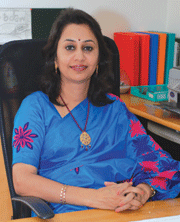 An economics and education postgraduate of Pune and Annamalai universities and the Principals Center for International School Leadership, Miami, USA, Sarojini Rao is principal of the Indus International School (IIS), Bangalore.
An economics and education postgraduate of Pune and Annamalai universities and the Principals Center for International School Leadership, Miami, USA, Sarojini Rao is principal of the Indus International School (IIS), Bangalore.
Purpose of school education. Schools are agents of transformation and not merely centres of academic excellence. Schools should transform students, teachers and local communities to make the world a better place.
Education thinker/philosopher you admire most. John Dewey and Robert Greenleaf, because of their pioneering work in experiential learning and servant leadership.
Differentiating characteristics of IIS education. Strong social conscience as evidenced by the world’s first equal opportunity school for the underprivileged set up alongside the main school; joint partnership with parents in all domains; leadership curriculum from class I-XII; emphasis on career counseling and placements in prestigious colleges around the world; promotion of the Indus Training and Research Institute (ITARI) for pre-service and in-service training of teachers.
Leadership style. I believe in servant leadership — to serve first, and then lead.
To what extent have you been able to implement your education philosophy in Indus International School? We have been successful in developing our students into caring citizens. Moreover as evidenced by the excellent scores of our students in international mathematics, science and English tests, placements in presti-gious colleges/universities around the world and sports achievements, we are on track.
For or against the RTE Act quota in private schools? Completely for it. In fact we are already running an equal opportunity school for under-privileged children on our campus.
Future plans for IIS. To develop the leader in every teacher and implement the leadership curriculum for students across all grades with specific focus on goals-setting and the art of reflection. This will be supplemented by other initiatives like the Pay-it-Forward move-ment, community service, communication and responsibility education.
De-stressing. Reading non-fiction; yoga; contemplation and reflection.
Jamila Singh
Mayo College Girls, Ajmer
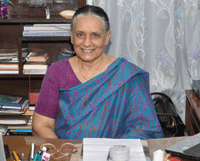 An alumna of St. John’s College, Agra, Jamila Singh began her teaching career at the Scindia Girls’ School, Gwalior and taught at Welham Girls’, Dehradun. In 1988, she was appointed founder principal and director of Mayo College Girls School (MCGS), Ajmer. In the EducationWorld-C fore India’s Most Respected Schools Survey 2010, Mayo Girls was ranked the premier girls’ boarding school countrywide.
An alumna of St. John’s College, Agra, Jamila Singh began her teaching career at the Scindia Girls’ School, Gwalior and taught at Welham Girls’, Dehradun. In 1988, she was appointed founder principal and director of Mayo College Girls School (MCGS), Ajmer. In the EducationWorld-C fore India’s Most Respected Schools Survey 2010, Mayo Girls was ranked the premier girls’ boarding school countrywide.
Purpose of school education. Schools that learn and continue to do so, impart true education. We believe that while it’s important to teach a child, it’s more important to make her want to learn. Schools that are constantly evolving, incorporating new ideas, responding and adjusting to the rapidly changing environment, are truly on the path of progress.
Most admired education thinker/philosopher. Dr. S. Radhakrishnan, former President of India and the late Miss Grace Mary Linnell, founder principal of Welham Girls’ School, Dehradun.
Differentiating characteristic of MCGS. Mayo Girls’ provides a unique opportunity for all-round education. We offer the security of Mayo’s rich tradition and an ethos conducive to developing each child’s potential to the fullest.
Leadership style. Over the years the school has grown but my easy accessibility remains, which has helped in sharing ideas and goals not only with teachers but also with students who are involved in every aspect of school life.
For or against the RTE Act quota in private schools? Presently, no comment.
Future plans. I’m confident that Mayo Girls’ will always stand for the pursuit of excellence, tolerance, progress, spirit of enquiry, humane attitudes and willingness to incorporate and accept fresh ideas.
Unwind/de-stress. The Quiet Time I observe in the mornings, similar to meditation, helps as does time spent with family which I greatly enjoy. I also read, listen to music and watch sports — all great de-stressers!
Manika Sharma
The Shri Ram School, Vasant Vihar
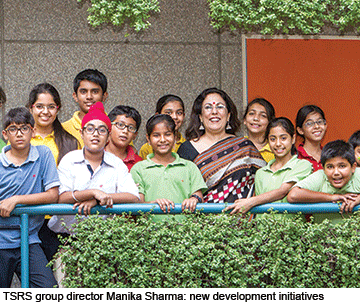 An alumna of Delhi University, Manika Sharma signed up with The Shri Ram School (TSRS), Delhi in 1989 and was appointed principal of its Vasant Vihar campus in 1994. Currently she is principal of both the junior Shri Ram Schools —Vasant Vihar and Aravali.
An alumna of Delhi University, Manika Sharma signed up with The Shri Ram School (TSRS), Delhi in 1989 and was appointed principal of its Vasant Vihar campus in 1994. Currently she is principal of both the junior Shri Ram Schools —Vasant Vihar and Aravali.
Purpose of school education. Education is about holistic growth and development. School education must inculcate in students the spirit of exploration, independent thinking and experimentation as a life-long process.
Most admired education thinker/philosopher. Dr. A.P.J. Abdul Kalam.
Differentiating characteristic of a TSRS education. Education here is experiential. Our students learn not only to absorb knowledge, but to apply it with balanced perspective.
Leadership style. My favourite mantra is “Leaders must shine in reflected glory”. Let the team get the accolades and appreciation. Prompt them, push them, praise them. I believe in encouraging leaders to grow from within!
Education philosophy implementation success. To a great extent. I have complete freedom and together with my team we deliver.
For or against the RTE Act quota in private schools? The private sector has ways by which it can contribute to universalisation of education. However the RTE dictates, rather than being a document formulated after discussion and debate with all stakeholders.
Future plans. We will continue to provide our students with moral leadership and the stimulation to foster inquiry, and innovation as part of their global respon-sibility. We will also develop our infrast-ructure in terms of state-of-the-art technology, laboratories, classrooms and playgrounds.
Unwind/de-stress. I love to curl up with a good book, watch television, clean and cook! Family time is important to me. Work-life balance is crucial.
Sathish Jayarajan
Mallya Aditi International School, Bangalore
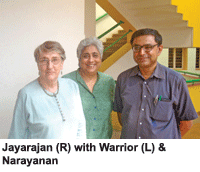 An alumnus of Bangalore and McGill (Canada) universities, Sathish Jayarajan signed up with Mallya Aditi International School (MAIS), Bangalore — ranked among the country’s top three day schools in the EW league tables — in 1988, and was appointed principal in 2003.
An alumnus of Bangalore and McGill (Canada) universities, Sathish Jayarajan signed up with Mallya Aditi International School (MAIS), Bangalore — ranked among the country’s top three day schools in the EW league tables — in 1988, and was appointed principal in 2003.
Purpose of school education. The purpose of school education is preparing students for life. We want our students to become confident, thinking, independent individuals sensitive to diversity, aware of their heritage, and able to meet the challenges of their time.
Most admired education thinker/philosopher. I am impressed with J. Krishnamurti’s insistence that fear has no place in education. I am also deeply indebted to communitarians Charles Taylor and Michael Sandel for illustrating that human beings are not unencumbered selves but deeply embedded in communities.
Differentiating characteristic of MAIS. Since its inception in 1984, Aditi has provided for innovation and excellence in education. We recognise that teaching is diverse and methodologically plural. This has enabled teacher innovation and reflective practice.
Leadership style. Consultative and decentralised. Leadership in this school has always been collective, with class teachers, coordinators, heads of department and others, each leading in their respective areas.
For or against the RTE Act mandating 25 percent quota in private schools? The school is committed to contributing to this constitutional ideal. My concerns are that it will greatly undermine the academic autonomy of schools with local authorities being given wide monitoring powers. This could prompt corruption and malpractice.
Future plans. I hope Aditi will continue to be a small, thoughtful and diverse community of learners, always striving to be better. I want the founding vision of Anne Warrior and Geetha Narayanan to persist in the DNA of the school.
Unwind/de-stress. Read a lot, watch TV and collect stamps. School is also enjoyable.
Sumer Singh
Daly College, Indore
.gif) Sumer Singh is principal of the co-educational CBSE-affiliated Daly College, Indore. A former teacher at The Doon School, Dehradun; Gordonstoun, Scotland; St. Anne’s and Boxhill, UK, Singh signed up with Daly in 2003.
Sumer Singh is principal of the co-educational CBSE-affiliated Daly College, Indore. A former teacher at The Doon School, Dehradun; Gordonstoun, Scotland; St. Anne’s and Boxhill, UK, Singh signed up with Daly in 2003.
Purpose of school education. To prepare students for life and this implies attaining multiple objectives and skills. To learn to live responsibly in a community, explore opportunities, discover and build on one’s strengths, develop a sense of spirituality, proportion, adventure, humour and compassion and acquire the confidence to follow one’s passion in the choice of career.
Most admired education thinker/philosopher. Gautam Buddha. His teachings are simple and easy to comprehend but so difficult to follow.
Differentiating characteristic of Daly College. A Daly College education is different on two counts — it is grounded in values and offers unlimited opportunities.
Leadership style. My idea of leadership is to encourage all members of my team to become leaders. To place the right person in the right position and then delegate and trust.
Education philosophy implementation success. I don’t know whether such an impressive word can be used for my thoughts on education. What I do know is that my ears and mind are open to suggestions that come from students, parents, colleagues, old Dalians and members of the board.
For or against the RTE Act quota in private schools? I am in favour of compulsory and universal education. As an essential component of society, private schools must participate and lead in achieving this national objective. My concern is that the RTE Act was not debated in appropriate forums and those who wrote the Act are not in touch with ground realities. However, at Daly College we have implemented the Act in word and spirit.
Future plans. To mould more and more young people into complete and contributing human beings who will in turn bring pride to the college.
Unwind/de-stress. Tennis, fishing, compulsory annual holiday with my teenage son. Most de-stressing of all is escape from my office into a classroom to enjoy the satisfaction of stimulating young minds.
Praveen Vasisht
The Lawrence School, Sanawar
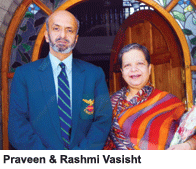 Praveen Vasisht is principal of the co-ed Lawrence School, Sanawar (estb.1847), ranked among the country’s top legacy boarding schools.
Praveen Vasisht is principal of the co-ed Lawrence School, Sanawar (estb.1847), ranked among the country’s top legacy boarding schools.
Purpose of school education. The purpose of school education is to prepare children not just for exams, but for life. Education should be ‘whole-some’ whereby children are taught not just the three R’s but values and leadership skills. The end product should be a competent, confident, balanced and happy human being.
Most admired education thinker/philosopher. Shri Aurobindo Ghosh and Sarvapalli Radhakrishnan.
Differentiating characteristic of Lawrence, Sanawar. We provide truly holistic education. Our goal is to marry our traditions with modernity, and science with spirituality.
Leadership style. My leadership style is to build a team of dedicated and passionate teachers. For me TEAM is the acronym for ‘Together Everyone Achieves More’. I believe in leading from the front, by example.
Education philosophy implementation success. By the grace of God I feel I’ve been able to implement my education philosophy at Sanawar. The results are there for all to see. Lawrence, Sanawar is consistently ranked among the top four boarding schools in the country, and we aspire to rise higher.
For or against the RTE Act mandating 25 percent reservation in private schools. In principle, I am for the RTE Act mandating 25 percent reservation for underprivileged children. Yet, there are problems regarding the financial aspect because not all private schools are necessarily affluent. A middle path needs to be created, and government must also assist in this endeavour.
Future plans. My future plans for The Lawrence School, Sanawar, are that sooner than later, we ‘would’ and not just ‘should’ be the best school of all.
Unwind/de-stress. I unwind by going on long solitary walks in the woods, photo-graphy, listening to music, and medit-ating.
Dr. Jyoti Bose
Springdales School, Delhi
 A sociology postgraduate of Delhi University with a doctorate in education from the London School of Economics, Dr. Jyoti Bose is the director of Springdales schools and principal of Springdales, Dhaula Kuan, Delhi.
A sociology postgraduate of Delhi University with a doctorate in education from the London School of Economics, Dr. Jyoti Bose is the director of Springdales schools and principal of Springdales, Dhaula Kuan, Delhi.
Purpose of school education. School education should empower young people with the skills needed to become truly global citizens of the ever changing and fragmented world. It must promote excellence in chosen fields and emphasise the values of human dignity, non-violence, secularism and pluralism.
Most admired education thinker/philosopher. Bertrand Russell. “If knowledge is wielded by love then society can be transformed,” he wrote.
Differentiating characteristic. Ours is an inclusive school which admits diverse groups of children from overseas, different states of India, the economically deprived and differently abled. We have a full-time diversity manager who oversees the integration of these children into the school environment and a Special Needs Centre with three full-time special educators.
Leadership style. Leadership is about empowering others through example and perseverance. Over the past 30 years I have endeavoured to ‘make’ many leaders by identifying and nurturing the individual talents of teachers and staff.
Education philosophy implementation success. I think by and large we have been successful in implementing our philosophy over the generations of Springdalians. The school motto — Vasudhev Kutumbakam translated as ‘The world is a family’ — acknowled-ges the oneness of the universe and linkages between peoples of the world.
For or against the RTE Act quota in private schools? Springdales first enroled underprivileged children in the late 1970s as part of its social responsibility to India’s uneducated millions. Evidently our school welcomes the RTE Act which mandates 25 percent reservation of seats for economically deprived and disadvan-taged children. But disadvantaged children need to be educated with sensitivity, pastoral care and skills for empowerment and dignity. Will all private schools be able to do this?
Future plans. Our long-term plans are to prepare students for the digital revolution; make environment educa-tion an integral part of our curriculum; organise international youth conven-tions and invite delegates from schools around the world and explore possi-bilities of offering the IB curriculum.
Unwind/de-stress. I am essentially a homebird and unwind by experimenting in the kitchen. I de-stress with travel each summer. I am also a huge dog lover.
Paul Machado
Campion School, Mumbai
.gif) An alumnus of Bangalore University and former vice principal of St. Mary’s School, Mumbai, Paul Machado has been principal of the Campion School, Mumbai since 2003.
An alumnus of Bangalore University and former vice principal of St. Mary’s School, Mumbai, Paul Machado has been principal of the Campion School, Mumbai since 2003.
Purpose of school education. Education excellence must help to develop comprehension, reasoning and thinking skills. It must also instill lifelong appreciation for learning and develop moral and ethical behaviour. Intelligence plus character should be the goal of education.
Education thinker/philosopher you admire the most. Mahatma Gandhi who believed that education is all-round drawing out of the best in child and man — body, mind and spirit.
Differentiating characteristic of Campion School. Our objective is to bring out the best in each child socially, intellectually, spiritually and in terms of personal development. To prepare our students to become worthy citizens who will bring about positive change in society.
Your leadership style. I strongly believe in involving all stakeholders — parents, teachers and students — in decision making. This gives everyone the feeling of belonging.
Education philosophy implementation success. I have been fairly successful in implementing my education philosophy due to a dedicated and diligent team of teachers, active participation of students, and support and co-operation of parents and the management.
For or against the 25 percent RTE Act reservation quota in private schools? The RTE Act’s 25 percent reservation for less privileged children in private schools is very good in principle. However, implementation of this provision is a problem as there are no clear-cut guidelines.
Future plans. In Campion we will focus on training our students to excel as “men for others”, reaching out to the poorest, in our quest to form a global community for peace.
Unwind/de-stress. Playing outdoor games — cricket, basketball etc with my students and spending quiet moments chatting with family and friends.
Jyotsna Brar
Welham Girls’ School, Dehradun
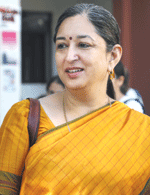 An English and education postgrad of Punjab University, Jyotsna Brar has been principal of the Welham Girls’ School, Dehradun since 2000.
An English and education postgrad of Punjab University, Jyotsna Brar has been principal of the Welham Girls’ School, Dehradun since 2000.
Purpose of school education. The purpose has to be to develop the ability to learn, develop an understanding of the world beyond ourselves and our own environments, learn new skills and develop attitudes and tastes which make us healthy contributors to the world.
Education thinker/philosopher you admire the most. Gandhiji. He had practical ideas about the needs and purposes of school education.
Differentiating characteristic of Welham Girls. What sets our girls apart is that they are down-to-earth, confident and intellectually, physically and emotionally robust. We don’t believe in a luxurious lifestyle and there’s emphasis on physical fitness. We have a very strong grounding in Indian languages, arts and culture, which develops a sense of pride in the aesthetics of our heritage.
Leadership style. I believe the only way to head a school team is to share the basic vision and philosophy of the institution with everyone and then give each team member opportunities for growth.
Education philosophy implementation success. I have been here for over a decade now and have been able to achieve quite a lot. However, it’s a continuous process. Each year is a new beginning, with new opportunities and challenges.
For or against the RTE Act mandating 25 percent reservation for underprivileged children in private schools? I think this particular clause in the Act intends ‘integration’, reducing social distances and fostering social understanding. I feel that India really and truly needs this.
Future plans. There are always plans to develop new and improve existing infrastructure specially sports facilities. I aso hope to be able to do more for staff development.
Unwind/de-stress. Books, music and plants (not necessarily in that order) — and travel.
D.N.A. Mountford
Assam Valley School, Balipara
.gif) An alumnus of St. Stephen’s College, Delhi and the School of African & Oriental Studies of London University, D.N.A. Mountford was appointed headmaster of the Assam Valley School (AVS), Balipara (estb.1995) in 2003. In the 2010 EducationWorld league tables of India’s most respected boarding schools, AVS was ranked No.1 in eastern India.
An alumnus of St. Stephen’s College, Delhi and the School of African & Oriental Studies of London University, D.N.A. Mountford was appointed headmaster of the Assam Valley School (AVS), Balipara (estb.1995) in 2003. In the 2010 EducationWorld league tables of India’s most respected boarding schools, AVS was ranked No.1 in eastern India.
Purpose of school education. Over-whelmingly, to stimulate in young people the belief that life is worth living! Beyond mere academics and examinations, exposure to sport, cultural pursuits and a life of the mind, all adding up to the vital life-skill of acquiring an independent contemporary world-view.
Education thinker/philosopher you admire the most. Bertrand Russell. There’s been no finer critic of the 20th century school as the starkest example in modern society of an institution modelled after the industrial-age assembly line. Also, in his time, a great proponent of iconoclastic education.
Differentiating characteristic of AVS. A school that learns at work and in play. We are young, idealistic, unafraid of new ideas and not bound by inert pedagogies and the dogmas of the past. Merge 235 acres of campus greenery in a new age school with unparalleled infrastructure and the best talent of north-east India, that’s AVS.
Leadership style. Leadership through action: measurable, tangible, responsible and accountable.
Educational philosophy implementation success. AVS has seasoned, matured and refined my belief in ‘engineering the cosmos of the learner’. From great success in implementing the concept of ‘pupil-ownership’ of events and activities and rapid absorption of technology to link with communities of learners worldwide, the idiom of the engaged ‘consumer’ (child) and satisfied ‘customer’ (parent) has enabled all our stakeholders to quickly build an institution of pan-India excellence.
For or against the 25 percent reserved quota under the RTE Act? Laudable in principle, but unfeasible in practice.
Future plans. Several new initiat-ives in our three-year School Development Plan, including cons-truction of a junior school offering an international curriculum.
Unwind/de-stress. Our children — constant companions, unspoilt, affable and endearing — keep me busy and cheerful.
Finbarr O’Regan
Ecole Mondiale World School, Mumbai
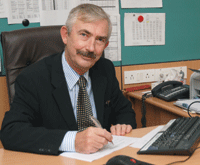 An English, Latin and education alumnus of University College Cork, Ireland and London University, Finbarr O’Regan has worked in education for over 30 years including several years in the Middle East, before taking charge as principal of Ecole Mondiale World School, Mumbai (estb. 2004) in 2007.
An English, Latin and education alumnus of University College Cork, Ireland and London University, Finbarr O’Regan has worked in education for over 30 years including several years in the Middle East, before taking charge as principal of Ecole Mondiale World School, Mumbai (estb. 2004) in 2007.
Purpose of school education. To provide an environment in which students of all ages are given opportunities to discover and develop their innate talents and abilities. I agree with George Bernard Shaw’s observation: “Education is not the filling of a pail but the lighting of a fire”.
Education thinker/philosopher you admire the most. I am drawn to the ideas of people such as Howard Gardner, Michael Fullan and Andy Hargreaves who have significantly contributed to educational practice.
Differentiating characteristic of Ecole Mondiale World School. Currently one of the very few schools in India and the only one in Mumbai, fully authorised to teach all three programmes of the IBO (International Baccalaureate Organisation) — the primary, middle years and diploma programmes. This ensures all our students are exposed to a broad and balanced curriculum until they complete grade XII.
Leadership style. I adhere, in the main, to the notion of the head of school being primus inter pares (first among equals) and delegate whenever feasible. But there are occasions when, as head of school, you cannot delegate.
Education philosophy implem-entation success. What attracted me to École Mondiale World School in the first instance was that it started life as an all IB programme school. Consequently, there was an instant match between my personal educational philosophy and of the school.
For or against the RTE Act quota in private schools? I think it is more to do with whether it is practicable.
Future plans. My main goal is to strengthen our found-ations in terms of the institutionalisation of all our programmes and pedagogy.
Unwind/de-stress. Dining out, the theatre when possible, listening to music, travelling and reading.
Roy Robinson
Bishop Cotton School, Shimla
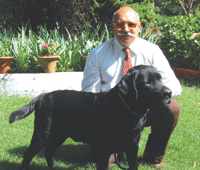 An alumnus of La Martiniere College, Lucknow, Chhatrapati Shahuji Maharaj (Kanpur) and Annamalai universities, Roy Robinson was principal of St. Peter’s School, Panchgani and Stanes School, Coimbatore before signing up as headmaster of Bishop Cotton School (BCS), Shimla in 2004.
An alumnus of La Martiniere College, Lucknow, Chhatrapati Shahuji Maharaj (Kanpur) and Annamalai universities, Roy Robinson was principal of St. Peter’s School, Panchgani and Stanes School, Coimbatore before signing up as headmaster of Bishop Cotton School (BCS), Shimla in 2004.
Purpose of school education. To encourage lifelong learning, developing confidence, initiative, independence, self reliance, teamwork, communication skills and extra-curricular education.
Education thinker/philosopher you admire the most. Jean Jacques Rousseau who said: “When we die we clutch in our hands only that which we gave away in our lifetime.”
Differentiating characteristic of BCS. Good education needs to nurture the latent talent within each individual, thereby developing leadership skills, which can be honed in the right setting by committed teachers. This is our objective in BCS, Shimla.
Education philosophy implementation success. The art of teaching is the art of assisting discovery. Education is not preparation for life, it is life itself. Only time will tell to what extent I have been able to implement this philosophy in BCS, Shimla.
For or against the RTE Act quota in private schools? Absolutely in favour. What better way to free underprivileged children from the shackles of ignorance and subsequent poverty than to provide them with high quality education?
Future plans. I hope I have sown the seeds of a progressive and futuristic school in step with changing education standards, trends and times of the 21st century.
Unwind/de-stress. I have nine dogs besides a collection of pigeons and gold fish. I join my students for games and sports off and on. I love gardening and for the past four years in a row The Headmaster’s Lodge garden has been declared the best private garden by the Shimla Amateur Garden and Environment Society.
Pramod Sharma
Genesis Global School, Noida
.gif) Currently, the founder principal of the Genesis Global School (GGS), Noida, Pramod Sharma is a former principal of the Tashi Namgyal Academy, Gangtok; Yadavindra Public School, Patiala and Mayo College, Ajmer.
Currently, the founder principal of the Genesis Global School (GGS), Noida, Pramod Sharma is a former principal of the Tashi Namgyal Academy, Gangtok; Yadavindra Public School, Patiala and Mayo College, Ajmer.
Purpose of school education. To provide every child with individual attention, modern facilities and exposure to best global practices of mentoring and care. It should also provide multi-cultural education rooted in values.
Education thinker/philosopher you admire the most. Kurt Hahn, founder of Gordonstoun School, UK and Salem, Germany; Round Square, Outward Bound Movement, and United World Colleges.
Differentiating characteristic of GGS. A curriculum that goes beyond academics with a holistic approach, democratic ethos and every child’s ‘Right to Sports’.
Leadership style. Democratic with the firm belief that wisdom does not flow from one head. Leaders need to provide opportunities for growth to all team members.
To what extent have you been able to implement your education philosophy in GGS? I am quite happy that in a short span of 14 months Genesis Global School has been able to implement most initiatives to provide holistic education. ‘Right to Sports’ means suitable games/sports for every student.
For or against the RTE Act quota in private schools? Everyone welcomes the RTE. But instead of improving standards in its own schools, the government wants to impose a 25 percent quota in private schools without matching grants. This will result either in cross-subsidisation of fees or decline in education quality.
Future plans. We have recently introduced a primary years programme. International certification and class XI for CBSE will start next year. We have acquired more land and construction of hostels for boys and girls, a dining block, staff accommodation and additional sports facilities, is about to commence.
Unwind/de-stress. I enjoy my work so the need to de-stress is less. However, I try and take a few days off whenever I travel. Apart from that I play racquet games, spend time with family and friends, and listen to Sufi music.
Dr. D.R. Saini
Delhi Public School, R.K. Puram
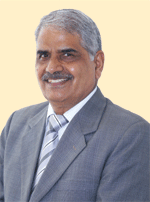 An alumnus of Punjab, Delhi and Annamalai universities, Dr. Daulat Ram Saini has served the Delhi Public School, R.K. Puram — repeatedly ranked the country’s No.1 school on the parameter of academic reputation in the annual EducationWorld league tables of India’s most respected schools — for over three decades. He was appointed principal of the school in 2009.
An alumnus of Punjab, Delhi and Annamalai universities, Dr. Daulat Ram Saini has served the Delhi Public School, R.K. Puram — repeatedly ranked the country’s No.1 school on the parameter of academic reputation in the annual EducationWorld league tables of India’s most respected schools — for over three decades. He was appointed principal of the school in 2009.
Purpose of school education. The purpose of school education in this age of globalisation is to prepare students to become alert and vigilant citizens and global ambassadors who should be physically fit, mentally alert, socially responsible, positive in their outlook and constructive in their approach.
Education thinker/philosopher you admire the most. I idolise Swami Vivekananda because of his interfaith awareness and belief that all religions are valid.
Differentiating characteristic of DPS, R.K. Puram. All stakeholders — students, teachers and parents — have contributed to build a strong foundation of moral values and social cohesion. Ours is a result-oriented institution which meets the requirements of all professionals in society.
Leadership style. My credo is to help my colleagues give their best to the institution by creating confidence in them and in their abilities, and to motivate them to contribute their interests and expertise. My administrative style is democratic and I guarantee my staff their rights and freedoms.
Education philosophy implementation success. Our philosophy of holistic development of students has paid rich dividends. This system has produced generations of students who are leaders in their respective professions, be it in administration, engineering, medicine or other spheres of profes-sional endeavour.
For or against the RTE Act quota in private schools? I am committed to endorsing the right to education to each and every child. But RTE in its present form needs modification in the mode and manner of implementation.
Future plans. To introduce latest innovations in teaching practice, understand the needs of students and adopt managerial styles which are relevant and sustainable in the fast changing world of education.
Unwind/de-stress. Accepting new responsibilities as a challenge. Accomplishment of my objectives gives me immense personal satisf-action and pleasure.
Devi Kar
Modern High School, Kolkata
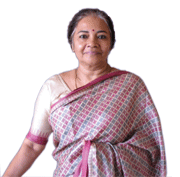 Devi Kar is principal of the Modern High School for Girls (MHS), Kolkata. An alumna of Presidency College and Calcutta University, Kar taught at La Martiniere for Girls, Kolkata and Cedar Girls High School, Singapore before assuming charge of MHS in 2000.
Devi Kar is principal of the Modern High School for Girls (MHS), Kolkata. An alumna of Presidency College and Calcutta University, Kar taught at La Martiniere for Girls, Kolkata and Cedar Girls High School, Singapore before assuming charge of MHS in 2000.
Purpose of school education. To preserve the sense of wonder that children come with, teach them to assume responsibility for their own learning and develop them into young adults who will catalyse the change they desire.
Most admired education thinker/philosopher. Rabindranath Tagore and Bertrand Russell.
Differentiating characteristic of MHS. An MHS education is not limited by the prescribed curriculum. It addresses the uniqueness of each student and her special set of strengths and weak-nesses. Every student is encouraged to think for herself, question, argue, plan and most importantly, to give. MHS does not prepare students for a career path — it attempts to prepare them for life.
Leadership style. It’s hands-on and strong.
Education philosophy implementation success. Far beyond my expectations. The school ethos is quite remarkable — students, parents and teachers value education in the true sense of the word and are not examination results fixated.
For or against the RTE Act reservation in private schools? I am all for social responsibility but I feel that the above clause is not at all practicable in its present form. There are not enough trained teachers to handle large, heterogeneous classes. It could end up harming all sections of the student population if implemented carelessly.
Future plans. Apart from raising the bar in every field I wish to address the disconnect between rural and urban India and get our students to engage in meaningful work in the hinterland. We have made a start by adopting a neighbourhood municipal school which we’ll develop into a model primary.
Unwind. I read, watch films/plays, listen to music, dine out, walk, travel and enjoy the company of family and friends.
Payal Kapur
Step by Step School, Noida
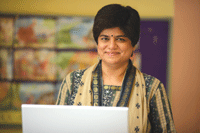 Payal Kapur is principal of the highly-rated CBSE-affiliated Step by Step School, Noida. Her 25-year career in education includes stints with the Aga Khan Centre, Delhi, Welham Boys, Dehradun and The Shri Ram School, Aravali.
Payal Kapur is principal of the highly-rated CBSE-affiliated Step by Step School, Noida. Her 25-year career in education includes stints with the Aga Khan Centre, Delhi, Welham Boys, Dehradun and The Shri Ram School, Aravali.
Purpose of school education. In my opinion the purpose of school education is to prepare young people for a life that is both challenging and fulfilling; to enable them to realise their potential and become constructive and contributing members of society.
Most admired education thinker/philosopher. Many including J. Krishnamurti, Shri Aurobindo, Steiner, Neill Summerhill and Ken Robinson.
Differentiating characteristic of Step by Step. As a community of students, teachers and parents, we are a learning organisation that enjoys living, working and playing together. Our focus is on teaching-learning for the entire school community, which includes a rich professional development programme for educators and skills-based programmes for our students and parents.
Leadership style. Consultative and consensual. I rely upon the opinions and support of my colleagues and ensure there is joy and laughter when we are together.
Education philosophy implementation success. We are a growing school but I believe we are well on the way to achieving the school of our dreams.
For or against the RTE Act quota in private schools? We are committed to upholding this provision of the RTE Act and will comply with the ruling of the Supreme Court.
Future plans. We want to grow into a joyful and caring community which allows students to find personal excellence and fulfillment. Moreover we look forward to our professional development centre becoming an educa-tion hub for sharing good practices with other schools.
Unwind/de-stress. I listen to my iPod while walking, travel whenever I can, swim, love cooking and cannot sleep without reading!
Maya Sukumaran
Gitanjali School, Hyderabad
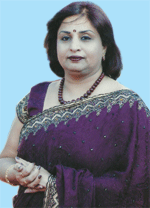 A mathematics postgraduate of Mumbai and Osmania universities, Maya Sukumaran is principal of the high-profile Gitanjali School, Hyderabad.
A mathematics postgraduate of Mumbai and Osmania universities, Maya Sukumaran is principal of the high-profile Gitanjali School, Hyderabad.
Purpose of school education. To enable all students to attain their full potential and acquire the knowledge, skills and attitudes required to build a healthy, democratic and pluralistic society.
Education thinker/philoso-pher you admire the most. Dr. Sarvapalli Radhakrishnan — a scholar, philosopher, seer, writer, orator, statesman and administrator.
Differentiating charact-eristic of Gitanjali School. We deliver balanced education including social and cultural experiences, while maintaining academic excellence.
Leadership style. Democratic, task and people-oriented, participative.
To what extent have you been able to implement your education philosophy in Gitanjali School? I have been able to substantially implement my education philosophy in Gitanjali. All events and initiatives are carefully planned and implemented following regular brainstorming sessions.
For or against the RTE Act mandating 25 percent reservation for underprivileged children in private schools. The RTE Act is currently under debate and we await the outcome. We will be happy to implement the final decision.
Future plans. We have recently introduced the IGCSE syllabus and are confi-dent of competing with the country’s leading international schools.
Unwind/de-stress. Spending time with students and meditation.
Manjit Batra
City Montessori School, Lucknow
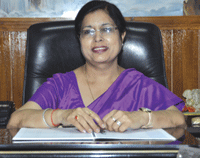 Manjit Batra is an education alumna of LucknowUniversity and principal of the City Montessori School, Gomtinagar, Lucknow. With 20 constituent institutions, CMS is the world’s largest single city school with 41,000 students.
Manjit Batra is an education alumna of LucknowUniversity and principal of the City Montessori School, Gomtinagar, Lucknow. With 20 constituent institutions, CMS is the world’s largest single city school with 41,000 students.
Purpose of school education. The purpose of school education should be to develop and release children’s inherent capabilities, analytical abilities, self-confidence, will power and goals-setting competencies to enable them to become self-motivated agents of social change.
Education thinker/philosopher you admire most. Maria Montessori who accepted the challenge of educating the so-called “uneducables” at a Roman university’s psychiatric clinic and conceptualised the Montessori method of education.
Differentiating characteristic of CMS. CMS education is focused upon the belief that a school should be a lighthouse of society, providing meaningful education, spiritual direction, guidance and leadership not only to its students but also to parents and society.
Leadership style. I believe in creating leaders. I make the effort to encourage every member of my team, including teaching and non-teaching staff, to become self motivated to accomplish the impossible.
Education philosophy implementation success. Right from a child’s formative years, we strive to inculcate all three kinds of education — material, human and divine. I believe we have succeeded in implementing this education model in our school.
For or against the RTE Act quota in private schools? I believe private schools should be given a free hand to provide education to deserving children. Children coming from uneducated backgrounds won’t be able to withstand the high standards of education and will find it difficult to cope with English medium teaching in private schools.
Future plans. We have been striving to produce world citizens who will become leaders and unite this disunited world, freeing it of its ills. Every year the school raises its bar of expectations to a new level and we plan to reach new heights continuously.
Unwind/de-stress. Yoga is a great stress-buster. Evening walks and reading too.
Valli Arunachalam
PSBB, Chennai
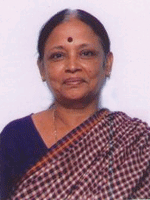 A mathematics, education and English literature alumna of Madras University, Valli Arunachalam began her teaching career with the Chennai-based Padma Seshadri Bala Bhavan (PSBB) Senior Secondary group of schools in 1977. Currently she is principal of the highly-ranked PSBB School (Nungambakkam) and the affiliated PSBB School (T. Nagar).
A mathematics, education and English literature alumna of Madras University, Valli Arunachalam began her teaching career with the Chennai-based Padma Seshadri Bala Bhavan (PSBB) Senior Secondary group of schools in 1977. Currently she is principal of the highly-ranked PSBB School (Nungambakkam) and the affiliated PSBB School (T. Nagar).
Purpose of school education. The primary purpose of school education is to help students acquire knowledge and master skills so they grow and shine as individuals.
Education thinker/philosopher you admire the most. I admire the legendary Dr. Y.G. Parthasarathy, dean and director of the PSBB group of schools, who is a pioneer in the field of education. She has propagated the philo-sophy that every child should come to school with a smile on her face.
Differentiating characteristic of PSBB School. Education at PSBB is fun-filled with each class transforming into an audio-visual education forum. We believe in stimulating all-round development of children by encouraging students to showcase their skills in cultural, co-curricular and sports activities.
Leadership style. I believe in a friendly collegiate approach towards my teachers and staff without losing sight of our institutional objective of providing high-quality holistic education to our students.
For or against the RTE Act mandating 25 percent reservation for underprivileged children in private schools? The RTE Act is certainly a lofty ideal. However, since it is difficult to admit 25 percent of underprivileged children in the existing PSBB schools, we intend to start a new school to enrol underprivileged children or adopt an existing school for the underprivileged.
Future plans. We have adopted the Sundara Cholavaram Panchayat School where we impart quality education and infrastructure facilities to equip underprivileged students for life. We plan to adopt more such schools in future. Also on the drawing board are plans to partner with international schools in the US, UK and Singapore, and exchange students and curriculums.
Unwind/de-stress. I have absolute faith in God and visit temples to maintain a mind-body-spirit balance. I also like solving Sudoku and crossword puzzles.
Vandana Lulla
Podar International School, Mumbai
.gif) Dr. Vandana Lulla is an English alumna of Bombay University and was awarded her Ph D by Open International University, Colombo. A former principal of the Springfield School, Mumbai, she was appointed director and principal of Podar International School (PI) in 2009.
Dr. Vandana Lulla is an English alumna of Bombay University and was awarded her Ph D by Open International University, Colombo. A former principal of the Springfield School, Mumbai, she was appointed director and principal of Podar International School (PI) in 2009.
Purpose of school education. Social, emotional, physical and intellectual development of students to create society’s leaders of the future. In short, to prepare them for life and making the world a better place.
Leadership style. Situational. I analyse each person and use the type of leadership required for her/him.
Differentiating characteristic of PI. We provide holistic education with best academic standards to students extending the boundaries of the learning environment beyond the classroom.
Education philosophy implementation success. I believe I have been very successful in implementing my education philosophy in Podar International. My goal was to bring world class education to India and I have succeeded in doing that by starting a wave of international schools in Mumbai.
For or against the RTE Act quota for underprivileged children in private schools? This is a commendable initiative to combat socio-economic inequality. However admitting children from poor families in class I is fine, but what happens when they finish elementary school?
Future plans. To place Podar International on the global education map by trans-forming it into a world-class university.
Unwind/de-stress. I believe in leading a healthy lifestyle — eating the right kind of food, exercising and spending weekends with family.
Kiran Bir Sethi
Riverside School, Ahmedabad
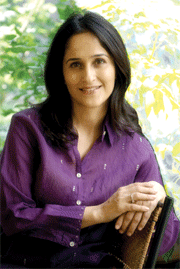 An NID-Ahmedabad graduate, Ashoka Fellow and innovator of the global Design for Change contest, Kiran Bir Sethi is founder-director of the IGCSE-affiliated Riverside School, Ahmedabad.
An NID-Ahmedabad graduate, Ashoka Fellow and innovator of the global Design for Change contest, Kiran Bir Sethi is founder-director of the IGCSE-affiliated Riverside School, Ahmedabad.
What should be the purpose of school education?
The purpose of education is to work towards ensuring every future generation has a quality of life better than today and nurture students who say ‘I can’ instead of ‘can I’?
Education thinker/philosopher you admire the most.
Howard Gardner, Mahatma Gandhi and Raag Sethi.
What is the different-iating characteristic of a Riverside School education?
Blurring the boundaries between school and life — basically putting common sense into common practice.
Your leadership style.
Leading with moral rather than positional authority.
To what extent have you been able to implement your education philosophy in Riverside School?
100 percent.
Are you for or against the RTE Act mandating 25 percent reservation for underprivileged children in private schools?
For. We are thrilled that we will be implementing it this year in partnership with our parents.
Your future plans for The Riverside School.
Focus on the present — the future will take care of itself.
Unwind/de-stress. Laugh, dance, family, eat, and watching Govinda movies.
Mallika Sen
Inventure Academy, Bangalore
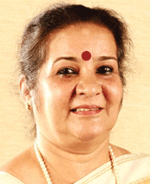 An English literature postgraduate of Calcutta University, Mallika Sen is a former principal of the Valley School, Bangalore, head of Aga Khan Education Services and currently principal of the Inventure Academy, Bangalore.
An English literature postgraduate of Calcutta University, Mallika Sen is a former principal of the Valley School, Bangalore, head of Aga Khan Education Services and currently principal of the Inventure Academy, Bangalore.
Purpose of school education. To prepare children to meet existential challenges. It must equip them with the knowledge and skills to innovate, excel in their chosen fields and contribute effectively to building a better society.
Most admired education thinker/philosopher. J. Krishnamurti, a leading thinker and educator of the 20th century who encouraged the awakening of intelligence out of observation, self-knowledge and compassion.
Differentiating characteristic of Inventure Academy. We have a set of core values which acknowledges every child’s uniqueness and potential. We believe in harnessing that potential for the common good. Our emphasis is on fair play, accountability and trans-parency, cultural sensitivity, consciousness of the envir-onment and institutional development through cons-tant review and refinement.
Leadership style. I look upon myself as a leader of competent and committed educators. I maintain a collaborative and consultative style of leadership, empowering faculty members at all levels.
Education philosophy implementation success. Inventure Academy has been set up along progressive lines of thinking. While achieving academic excellence is the focus, other aspects of students’ development are given equal importance. The vision and mission statements of the school are incorporated into the curriculum.
For or against the RTE Act mandating 25 percent quota for underprivileged children in private schools? Private schools can contribute towards providing high-quality education to economically weaker sections of society by adopting neighbourhood schools, building capacities of teachers in such schools, helping develop meaningful and relevant curriculums. Reservation of 25 percent seats for underprivileged children is not necessarily the sine qua non.
Future plans. Sustained faculty development. We also intend to address environmental issues that immediately impact our campus as well as create awareness in students to look at the big picture and strive towards reducing their carbon footprint.
Unwind/de-stress. Long walks, reading fiction, and listening to instrumental music.
Amarjyot Singh
Pinegrove School, Solan
 An alumnus of the Lawrence School, Sanawar; National Defence Academy, Khadakvasla; Indian Military Academy, Dehradun; and College of Materials Management, Jabalpur; Capt. (Retd.) Amarjyot Singh is principal of the wholly-residential Pinegrove School, Dharampur, Solan district, Himachal Pradesh.
An alumnus of the Lawrence School, Sanawar; National Defence Academy, Khadakvasla; Indian Military Academy, Dehradun; and College of Materials Management, Jabalpur; Capt. (Retd.) Amarjyot Singh is principal of the wholly-residential Pinegrove School, Dharampur, Solan district, Himachal Pradesh.
Purpose of school education. I believe that teachers and parents have to join hands in imparting sound moral values (sanskar) to children. This is the essence of quality education.
Education thinker/philosopher you admire the most. Mohandas Karamchand Gandhi.
Differentiating characteristic of Pinegrove. Apart from the academic and sporting brilliance of our senior children, our USP is in establishing, running and maintaining a happy institution.
Leadership style. I believe in a participative style of functioning, with free-flow communication and easy access.
Education philosophy implementation success. Implementation of my education philosophy in Pinegrove has been achieved beyond my dreams.
For or against the RTE Act quota in private schools? The RTE Act has generated anxiety, worry and fear about several issues including forced reservation in private schools for poor neighbourhood children.
Future plans. After completion of a new 750-seat auditorium later this year, we will begin construction of a state-of-the-art, modern, all-weather, indoor sports complex spread over almost two acres.
Unwind/de-stress. Physical activity is a great way to unwind, hence I play badmi-nton, cricket, soccer, hockey etc on a regular basis with our students and staff in addition to reading.
Anuradha Monga
Bangalore International School
.gif) An alumna of Punjab and Delhi universities, Anuradha Monga is president of The Association of International Schools of India (TAISI) and principal of the Bangalore International School (BIS, estb.1969).
An alumna of Punjab and Delhi universities, Anuradha Monga is president of The Association of International Schools of India (TAISI) and principal of the Bangalore International School (BIS, estb.1969).
Purpose of school education. The purpose of school education should be to learn in a humanistic setting.
Education thinker/philosopher. Pascal Chazot.
Leadership style. I like teamwork, that’s the only way to get things done. More often than not, I play the role of intermediary, making sure the entire school community interacts effectively and peacefully.
Differentiating characteristic of BIS. The Bangalore International School is a playground for learning. If people are happy, they learn well. I see many schools giving over-importance to academic rigour, often at the expense of a child’s well-being.
Education philosophy implementation success. I can confi-dently say that my core educational philosophy is at work, changing and growing with the school.
For or against the 25 percent reservation quota that the RTE Act mandates? Problems arise when divergent socio-economic classes interact. If this issue is not tackled sensitively, the benefits intended for the underprivileged will be negatived. Private schools must learn to minimise explicit expression of class, by monitoring attire and other paraphernalia.
Future plans. I want BIS to grow, not in numbers but in opportunities. I seek talented teachers, individuals who can impart spirit into children’s learning. I want my teachers to also be good students as much as I want my students to be good teachers.
Unwind/de-stress. I like to spend time with my children, watch good movies, play golf, and read.
Anuradha Sharma
Ryan International School, Noida
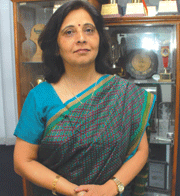 Anuradha Sharma, a science and education alumna of La Martiniere Girls, Lucknow and G.B. Pant University, Nainital, is a former headmistress of St. Xavier’s High School, Raipur and currently principal of Ryan International School, Noida (estb. 1992).
Anuradha Sharma, a science and education alumna of La Martiniere Girls, Lucknow and G.B. Pant University, Nainital, is a former headmistress of St. Xavier’s High School, Raipur and currently principal of Ryan International School, Noida (estb. 1992).
What should be the purpose of school education?
Children should be educated to become productive and compassi-onate human beings and not just content reproducing machines. Hence the purpose of school education should be to tap all their abilities and talents to prepare them for fulfilling and successful adult lives.
Education thinker/philosopher you admire the most.
Dr. Grace Pinto, our founder managing director — an educator par excellence.
What is the differentiating charact-eristic of a Ryan International School education?
Ryan International schools offer a well-designed curriculum that takes into consideration the general development of every child and prepares him for cut-throat competition in the professional arena. We lay equal stress on academics as well as provide global exposure through INMUN, ICFPA, ICEPLEX, Presidential Classroom — all multinational student exchange programmes.
Leadership style. Leadership is action and not position. I believe in taking charge and leading by example.
For or against the RTE Act mandating 25 percent reservation for under-privileged children in private schools?
It’s a very useful and important idea, provided there is no misuse of documentation required to classify children as underprivileged. Hence only children in desperate need should get the benefit of this reservation.
Future plans for Ryan International School. I would like to see more collaborations with NGOs and world bodies such as UNESCO, WHO, UNICEF, etc. I would also like to see more of our students take up sports as a career, and there are plans to introduce vocational training to provide hands-on exper-ience to our students.
Unwind/de-stress. My family is my anchor and time spent with family is always relaxing. I also enjoy reading, music and catching up with friends and relatives.